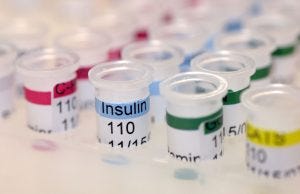
Sanofi will see its short-acting follow-on insulin Admelog be regulated as a biosimilar from 2020 under US FDA plans to promote competition. But the need for additional studies to show interchangeability could delay any impact, the firm says.
The US Food and Drug Administration (FDA) has been actively pursuing efforts to increase adoption of biosimilar products over the past year. In July, the Agency published a ‘Biosimilars Action Plan’ aimed at promoting access to lower-cost biosimilar drugs while maintaining a desire for new biologics innovation.
In the latest efforts this month, the Agency has published two draft Q&A guidance documents and two final guidance documents on biosimilar development, and the deemed to be a license provision of the Biologics Price Competition and Innovation Act of 2009 (BPCIA), as well as a proposed rule amending the definition of a biological product. The documents have been analyzed here by RAPS.

Image: iStock/brakenj
One of the key pushes by the FDA is the conversion of approved insulin and human growth hormone, currently treated as new biological drugs, into biosimilars. These are products which have historically been approved under section 505 of the Federal Food, Drug, and Cosmetics Act (FD&C Act), rather than the dedicated biosimilar 351 pathway.
“Biological products that have been approved under section 505 of the FD&C Act will be removed from the FDA’s Orange Book on March 23, 2020, based on the agency’s position that these products are no longer ‘listed drugs,’” the FDA said in a statement. “That means that a follow-on applicant won’t be able to rely upon these NDAs for approval. They have to go down the biosimilars path after the transition.”
Sanofi’s Admelog
Sanofi’s short-acting insulin Admelog, was approved in December 2017 as ‘follow-on’ insulin product. The product is classed as a biosimilar to Eli Lilly’s Humalog (insulin lispro) in the EU.
“Sanofi has been expecting additional guidance from the FDA on the 2020 transition of medicines, including insulins, to be regulated as biologics and therefore be subject to the existing biosimilars pathway,” Sanofi spokesperson Jon Florio told BioProcess Insider.
“Admelog will be one of a number of approved insulin products that will be transitioned to be regulated as a biologic.”
Interchangeability
In its discourse, the FDA says it is confident that after the transition to biosimilar status interchangeable insulins will be achievable. This would mean insulin products could be substituted at the pharmacy level for other insulins.
However, according to Florio, “current guidance is not explicit on the possibility of Admelog to seek interchangeability at this time.”
The FDA has approved 15 biosimilars but none are deemed interchangeable. This limits the uptake of these biosimilars. In January 2017, the Agency release long-awaited draft guidelines on interchangeability, recommending firms undertake ‘switching studies’ to show whether alternating between a biosimilar and its reference product impacts the safety or efficacy of the treatment.
“Interchangeability is an additional standard beyond the requirement for biosimilarity,” said Florio. “In addition, regulatory guidance associated with interchangeability currently includes the need for switching studies. These regulatory hurdles associated with interchangeability may delay any impact from substitutable insulin products for some time.”
His views mirror those of payors and other biosimilar developers and marketers, who argue switching studies – which are not necessary in Europe – restrict the uptake of biosimilar products.
About the Author
You May Also Like

schedl_b_and_w.jpg?width=100&auto=webp&quality=80&disable=upscale)
schedl_b_and_w.jpg?width=400&auto=webp&quality=80&disable=upscale)



